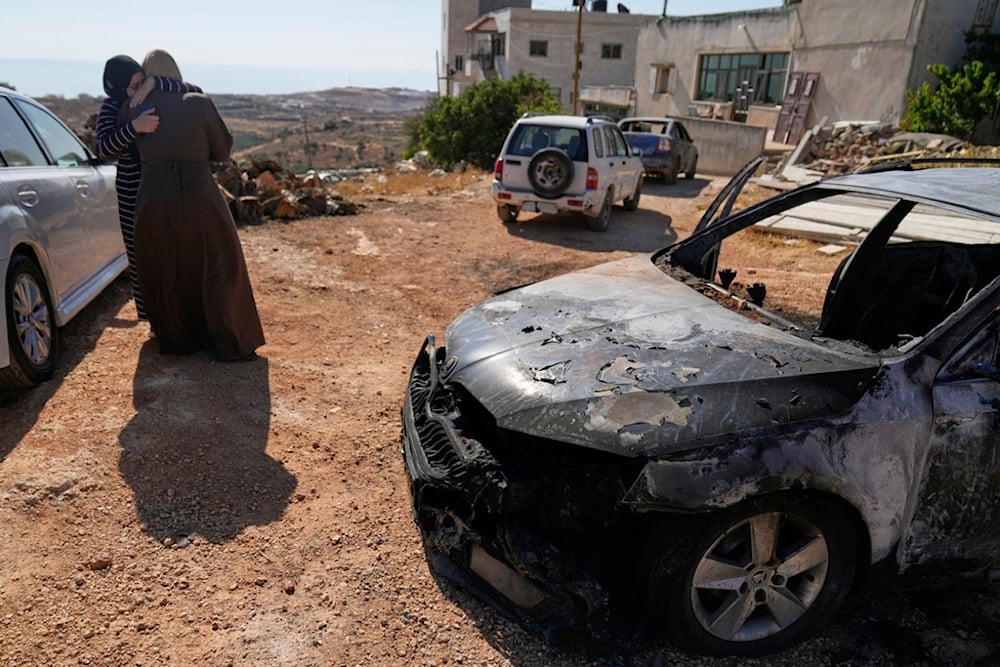Settlers shoot and assault Palestinians in Hizma, Masafer Yatta
Israeli settlers injured multiple Palestinians in attacks on Hizma and Masafer Yatta, as violence escalates under the protection of occupation forces.
-

Women comfort each other by a vehicle that was burnt overnight by Israeli settlers in an attack that killed three Palestinians and burnt several vehicles and damaged homes, in Kafr Malik, east of Ramallah, Thursday, June 26, 2025. (AP)
At least three Palestinians were wounded by gunfire on Sunday evening after an armed group of Israeli settlers attacked residents in the eastern part of the town of Hizma, northeast of occupied al-Quds.
Local sources reported that settlers opened fire directly at Palestinians in the area, injuring three. The attack marks the latest in a growing wave of settler violence across the occupied West Bank, often carried out under the protection of the Israeli occupation forces.
Assaults continue in southern West Bank
Further south in Susiya village, located in the Masafer Yatta area south of al-Khalil, settlers assaulted residents and stormed their homes, leaving at least two Palestinians, an elderly man and a young man, injured.
Human rights activist Osama Makhama confirmed that "a group of armed settlers attacked the homes of Palestinian residents in Susiya, beating several people and causing bruises and injuries." He emphasized that the assault occurred while Israeli occupation soldiers were present, offering protection to the attackers instead of intervening.
Earlier in the day, four more Palestinians, including a woman, were also wounded during a similar settler raid in Khirbet Umm al-Khair, another village within the Masafer Yatta region. Witnesses said the assailants were armed settlers disguised in Israeli military uniforms, a tactic that has raised serious concerns among rights groups.
The villages of Masafer Yatta have been frequent targets of settler violence, part of a wider policy of intimidation and forcible displacement carried out by the Israeli occupation. Residents and activists warn that such attacks are part of an organized effort to drive Palestinians from their lands under the guise of settler expansion and so-called “security” enforcement.
Raids intensify in West Bank
Israeli occupation forces and settlers launched a wide-ranging escalation across several areas of the northern occupied West Bank on Saturday, carrying out detentions, violent assaults, and road closures, particularly in and around the city of Nablus.
In the village of Urif, south of Nablus, Israeli forces detained the parents of martyr Muhannad Shahada, one of the Palestinians involved in the recent ‘Eli operation, as well as his brother Ihab Shahada, who was arrested from his workplace inside the territories occupied since 1948. The move is part of the occupation’s policy of targeting relatives of Palestinian fighters.
Elsewhere, in the village of Tell, southwest of Nablus, Israeli forces arrested a young man named Mahmoud Asida during a dawn raid. Later in the day, the village came under attack by dozens of Israeli settlers, who raided the Kafrour area under the protection of occupation soldiers.
Armed confrontations erupt as settlers storm villages
Palestinian youth confronted the settler assault, triggering fierce confrontations, which saw Israeli soldiers fire live ammunition at local residents, amid a state of high tension and mass mobilization in the village of Tell.
Meanwhile, settlers gathered at an entrance to Nablus, demanding what they called “permanent control” over Joseph’s Tomb, a move widely condemned as a deliberate provocation and part of broader efforts to impose new settlement realities in the occupied West Bank.
Read more: Israeli forces storm West Bank towns, shut down Christian sites
Israeli forces continued to block the main entrance to al-Lubban al-Sharqiya, south of Nablus, using earth mounds to obstruct Palestinian movement. The road closure has caused severe traffic congestion and disrupted daily life in the area.
In a further escalation, Israeli forces also stormed the town of Aqaba, north of Tubas, and later raided the city of Tubas, expanding their military operations beyond the Nablus region.

 4 Min Read
4 Min Read










